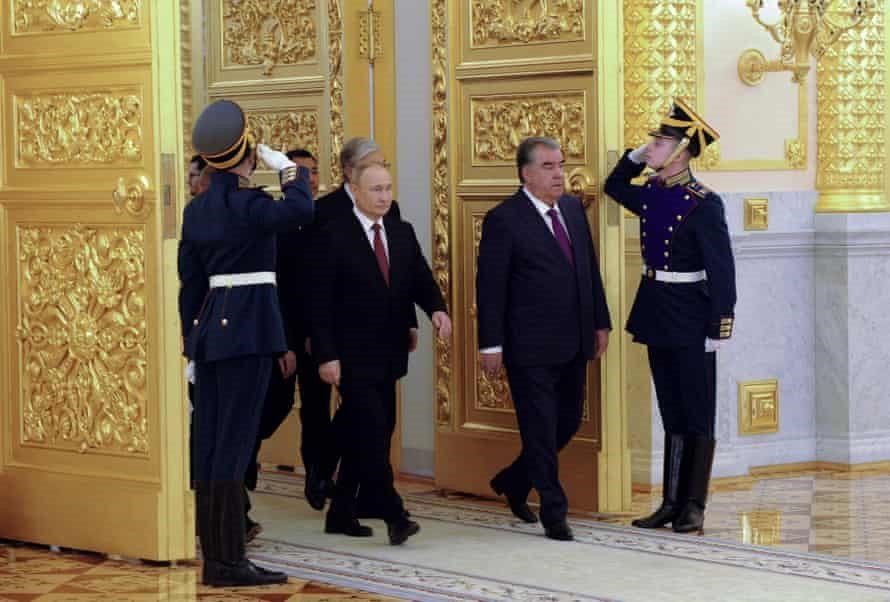Tajikistan’s interior ministry says 70 ‘active members of a terrorist group’ were detained after deadly clashes in Gorno-Badakhshan.
Government forces in Tajikistan have killed at least 25 ethnic Pamiri minority members during a protest in the autonomous region of Gorno-Badakhshan (GBAO), according to a report published in The Guardian newspaper.
Escalating tensions between the cultural, linguist and ethnic groups and the government turned violent on Wednesday when security forces opened straight fire on the protesters who have long faced human rights abuses and discrimination over jobs and housing.
In an otherwise authoritarian country, the Pamir region happens to be the only part of the country where protesters still take to the streets against the government.
The fresh killings mark another dark chapter in the violent history of the region where conflict between the central government and the Pamiris has lasted for decades.

International media reported that hundreds of Khorog natives took to the streets calling for the dismissal of the governor and the release of people arrested for participation in a protest in November when three men were killed and 17 wounded by security forces during a protest.
The government in a statement claimed “members of an organized criminal group” had blocked a highway “in order to destabilize the social and political situation”.
The Guardian reported that in order to push the marching protester back, security forces started firing rubber bullets, stun grenades, and teargas at the protesters, killing at least 25 people.
In a statement on the state news agency, Khovar, the interior ministry said: “Law enforcement agencies have begun an anti-terror operation … in a restive region that borders Afghanistan and China and has long been a flashpoint of tensions.”
The Tajik authorities claimed that arms and support from foreign “terrorist organisations” were coming into the Pamiri region.
“The organised criminal groups did not comply with the lawful demands of law-enforcement officers to hand over their weapons and ammunition, and put up armed resistance,” the interior ministry said.

But activists said their protests had been peaceful. “The government is branding and naming the peaceful protesters as ‘terrorists’, which is a complete fake, and then using that as an excuse to shoot at them,” said one Pamiri activist who cannot be named for security reasons.
During the Tajikistan civil war from 1992 to 1997, thousands of Pamiris were killed in what some human rights activists have described as “ethnic cleansing”.
In 2012, during clashes seen by many in GBAO as an attempt by the Tajik government to bring the autonomous region under its full control, at least 40 civilians were killed.
In February, parents of men killed by Tajik forces during a protest in November called on the international community to step in and protect ethnic minority groups.
Families have demanded that the soldiers responsible for killing their sons be brought to justice and urged the UN to intervene.
Tajikistan’s president of 28 years, Emomali Rahmon, who met the Russian president, Vladimir Putin, on Monday, is seen by the Pamiri as wanting to take control of Gorno-Badakhshan.
Neil Clarke, head of the legal programme at Minority Rights Group International, told the Guardian: “The deteriorating human rights situation in the region is leaving the population, who are mainly Indigenous peoples and ethnic and linguistic minorities, at serious risk of harm.
“We now believe that without urgent measures, the situation could escalate towards increasing conflict,” he said. “The widespread harassment of the population of GBAO by authorities including the police, security and military personnel appears increasingly systematic. These include wide-ranging forms of surveillance and invasions of privacy, arbitrary detention and the use of coercion to obtain signatures and/or public statements against the will of the individual.”
Since November security checkpoints have been reinforced, and hundreds of people who took part in the demonstrations have been arrested or banned from leaving the region. Clarke said the latest deaths marked renewed efforts to suppress the Pamiri.
“Authorities have reinstated a blockade on internet connection in the region and have again begun to arrest and detain prominent civil society leaders and independent individuals under the alleged pretext of an ‘anti-terror operation’,” he said.
“Pamiri people are not the terrorists. We are calling for urgent measures by Tajikistan authorities to de-escalate the developing conflict, by restoring and ensuring the respect for human rights in GBAO and most urgently call on authorities to release the activist Ulfatkhonim Mamadshoeva and others who have been detained and interrogated by security forces, without due process, as part of efforts to silence the voice of Pamiri activists.”
Since crackdowns on opposition groups in 2014 in Tajikistan, it is thought that 15 activists who left the country have disappeared in Russia or Turkey.

